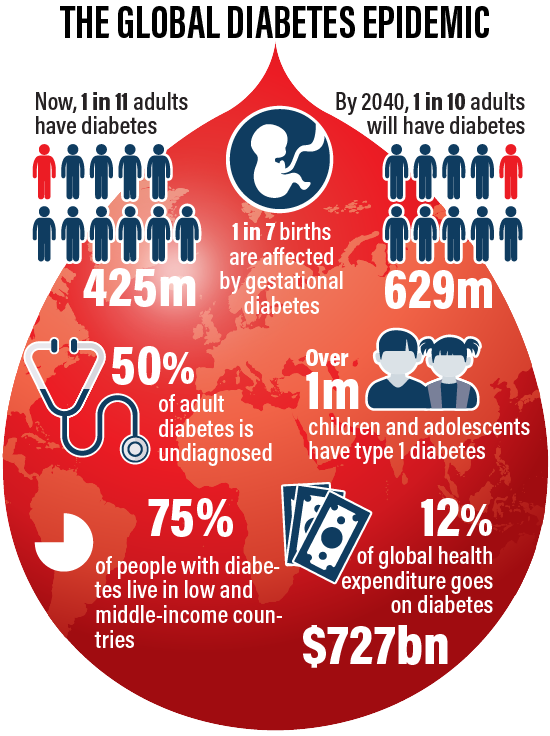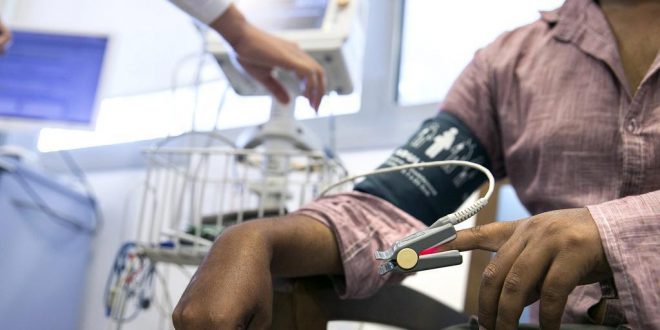Hundreds of diabetic Emiratis are dying each year because of poor control of their blood-sugar levels, research found.
Fewer than one in four diabetes patients were properly managing their condition, a sample suggested, with more than 800 deaths resulting annually from inadequate management of the condition.
Women are more severely affected, with as many as half of deaths among female Emiratis with diabetes the result of poor control of blood sugar.
The findings come from a study by three researchers from the College of Medicine and Health Sciences at UAE University in Al Ain published in BMJ Open, linked to the British Medical Journal.
Worldwide, diabetes is estimated by the World Health Organisation to be the seventh-leading cause of death, but it is an especially severe problem in the Middle East and the Emirates.
Here, diabetes affects more than one in six people and, among UAE residents under 60, is a factor in 69.1 per cent of deaths.
The researchers analysed the medical records of 487 Emirati diabetes patients undergoing treatment and found that in only 113 of them was there adequate control of a substance found in the blood called glycated haemoglobin.
“We were extremely surprised at this finding,” said the lead author of the study, Dr Saif Jaber Al Shamsi, a UAEU assistant professor.
Diabetes is characterised by the body failing to produce or respond to insulin, leading to abnormally high levels of glucose in the blood.
Glycated haemoglobin forms when glucose binds to the blood protein haemoglobin.
As well as the 487 people being treated for diabetes, the researchers also looked at the medical records of 96 Emiratis who had high glycated haemoglobin levels but were not on medication.
Over a nine-year period, 86 of the 583 people analysed, or 14.8 per cent, died. Using a statistical technique, the researchers calculated the proportion of deaths that were due to poor diabetes control.
“Overall, we found that a third of all deaths were due to poor diabetes control, meaning that a third of all deaths could have been avoided if patients had optimal glycaemic control,” said Dr Al Shamsi.
“When we analysed it separately by sex, we found that 50 per cent of deaths could have been avoided if women with diabetes had optimal glycaemic control, and 17 per cent of deaths could have been avoided in men if they too had optimal control of their diabetes.”

Given that about 155,000 Emiratis have diabetes, these percentages translate into 840 avoidable deaths from the condition annually among diabetic UAE nationals.
Dr Al Shamsi, who produced the new study with Dr Romona Govender and Dr Elpidoforos Soteriades, suggested that women may be more severely affected because the menopause can affect glycaemic control, so they may need closer monitoring. Another factor could be higher obesity levels in women.
Dr Sarla Kumari, a specialist physician and diabetologist at the Canadian Specialist Hospital in Dubai, said that even in countries such as the United States and Canada with highly advanced medical systems, optimal blood-glucose targets were achieved in only about half of diabetes patients.
She highlighted several factors that could result in poor diabetes control in the Emirates, including sedentary lifestyles and unhealthy food.
“The hot weather usually keeps us indoors and we end up getting zero to minimal physical activity. All these factors contribute to poor control of diabetes,” she said.
Dr Al Shamsi said patients not adhering to treatment advice, perhaps because of side effects, could partly be to blame for poor glycaemic control.
Another reason, he said, could be a global problem called therapeutic inertia, which refers to doctors intervening only when glycated haemoglobin levels are inappropriately high.
To better control diabetes, Dr Al Shamsi said doctors should encourage patients to eat healthy, exercise and stop smoking.
“To accomplish this, we need to empower patients to participate in the decision-making process so that they are more likely to modify their behaviours or practise them on a daily basis,” he said.
The researchers are now looking at problems caused by poor management of other serious health conditions, including high blood pressure.
The National
 UAE BARQ برق الإمارات – نبضك
UAE BARQ برق الإمارات – نبضك



